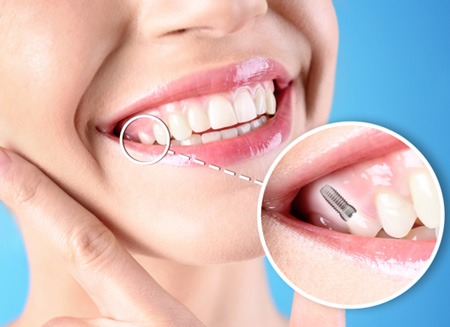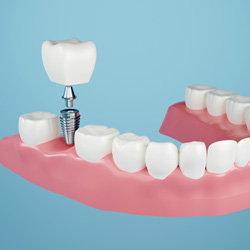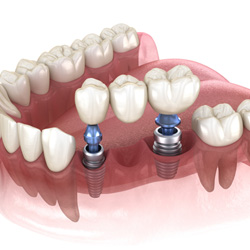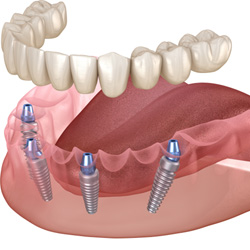Dental Implants – Sachse, TX
Tooth Replacements with Support

Traditional dentures and dental bridges only replace the visible parts of the tooth, not the roots. While these restorations let you eat, speak, and smile with confidence again, they just don’t have the same support as your natural teeth. That’s why Sachse Family Dentistry at Woodbridge frequently recommends dental implants in Sachse, TX, to fill in the gaps in your grin; your new teeth will look and feel natural in your mouth! Contact us today to schedule a consultation and begin the dental implant process.
Why Choose Sachse Family Dentistry at Woodbridge for Dental Implants?
- Partners with Dental Implant Specialists in the Area
- Advanced Technologies for More Accurate Treatment Planning
- Flexible Financing & In-House Membership Plan Available
What Are Dental Implants?

There is no other tooth replacement quite like dental implants because of how they replace missing teeth from the root to the crown. Not only does this mean you can have confidence in the longevity and health of your teeth, but you can smile with ease and eat your favorite meals without any concern. It’s one of the reasons why not only Dr. Rottman recommends dental implants, but so many dentists across the country as well. Even if you’ve been missing teeth for a very long time, chances are you’re a candidate for this life-changing and groundbreaking tooth replacement method.
The 4-Step Dental Implant Process

More and more, people are discovering that dental implantation is a viable means of replacing their missing teeth. However, given that it requires a minimally invasive surgical procedure to insert the implants, you likely have some questions about how the dental implant process works. As part of our efforts to provide accurate and up-to-date information so you can feel comfortable about having implants placed, we’ve outlined some of the key details about the procedure. If you want to learn more, feel free to contact us to schedule a visit.
Initial Consultation
When you visit us for a consultation, it serves several purposes. For starters, it allows us to assess the condition of your oral health to determine your eligibility for the dental implant procedure. This will include us taking X-ray images and Dr. Rottman measuring your jawbone density to ensure there is enough to support a dental implant.
Although we’ve helped countless patients rebuild their smiles, we know it’s likely the first go-around for you, so we’ll take the time to guide you through every step of the process. While visiting, you’ll also be able to ask any questions you may have.
Dental Implant Surgery
Before the surgery gets underway, a local anesthetic is applied to numb the treatment site. Therefore, you can look forward to a painless procedure. If you’re experiencing some anxiety about the implantation process, we can also provide sedation dentistry to calm your nerves.
After verifying that you’re numb, the specialist will make an incision into your gums to gain access to your underlying bone. Then, a small hole will be drilled to allow for the insertion of the dental implant. Once the implant is placed, a protective cap will be added to protect the area while you heal.
Team-Based Dental Implant Treatment
Your teeth are essential for maintaining a high quality of life, so when you replace them with dental implants, it’s important that the procedure be performed with precision and expertise. That’s why Dr. Rottman works with local specialists during the placement phase of the treatment. This will give you the greatest chance of success with your surgery and ensure that you’re receiving care from a true expert at every stage.
Osseointegration & Abutment Placement
Across the board, dental implantation has a 95% success rate. This can greatly be attributed to the fusing of the titanium post to the jawbone. The process, called osseointegration, can sometimes take up to six months to complete, but it’s well worth the wait. As the new bone cells form around the implant, it will be permanently fixed in its position.
After you’ve healed from the initial placement and the osseointegration process is complete, your dentist in Sachse will add an abutment. Its attachment to the implant ensures that the replacement prosthetic can be locked into place, with no slipping.
Delivery of Final Restoration
The dental implant procedure is the only form of tooth replacement that doesn’t rely on the surrounding teeth, suction, or gum tissue for security. Instead, it is completely self-sufficient. Whether you’re receiving a dental crown, implant bridge, or implant denture, the placement of the restoration will be the final step of the process. To ensure you have the best fit possible, we’ll work closely with dental lab technicians to create a prosthetic that is just right for you. Therefore, your new teeth will match the color, size, and shape of the rest of your smile.
Benefits of Dental Implants

Dental implants are one of the most highly recommended tooth replacement solutions by patients and professionals alike because they offer a wide array of unique benefits. At Sachse Family Dentistry at Woodbridge, we want our patients to love their smiles and feel confident eating, laughing, and speaking. That’s why we offer custom-designed and durable tooth replacement solutions to last a lifetime, like dental implants. To learn about some of the benefits that you’ll be able to enjoy with implants, read below or schedule a consultation by contacting our dental office today!
Enhanced Chewing Power
Dental implants provide your crown, bridge, or denture with a secure and stable foundation to be attached to. Since your implant posts are fused with your jawbone, you won’t have to worry about your restorations moving or shifting in your mouth. This makes chewing tough and crunchy foods, like steak and crusty bread easier than ever.
No Alteration of Healthy Teeth Required
Traditional restorations like dental bridges have to be attached to your natural, healthy teeth to stay in your mouth. This means that they have to be altered, which typically requires removing a portion of their enamel. Not only can this make them more susceptible to decay, but it can also weaken them. With dental implants, you won’t have to worry about this happening because your restorations are anchored to the implant posts instead.
Lifespan of 25+ Years
Unlike traditional restorations, like dentures, dental implants can last for 25 years or longer, according to several scientific studies. That’s nearly three times longer than regular dentures and bridges, which means that you’ll be able to save money while enjoying a smile that grows with you.
Jawbone & Facial Structure Preservation
One of the most notable benefits of dental implants that sets this procedure apart from traditional restorations is the fact that they don’t just restore the biting surface of your teeth—they also restore the root structure. When the implants are placed into your jawbone, they’re able to undergo a natural process called osseointegration, where they fuse with the bone, just like the roots of your natural teeth. This provides the bone with stimulation and blood flow that keeps it from deteriorating and changing the structure and appearance of your face.
Who Dental Implants Can Help

Patients who suffer from any degree of tooth loss can potentially benefit from dental implants. However, the number of implants and the type of restoration they support will vary greatly from person to person. In any case, you’ll need to come in for a consultation with Dr. Rottman so that we can confirm you’re a good candidate for dental implants before we begin putting together your custom treatment plan. With that in mind, here’s what you need to know about dental implant candidacy.
Who Is a Good Candidate for Dental Implants?

While dental implants are a fantastic option for most patients with missing teeth, there are a few factors in play that determine one’s eligibility. Patients must be in decent oral health and be free of issues like gum disease, which is directly linked to dental implant failure. Additionally, patients also need to have an adequate amount of remaining jawbone tissue to support the implants; otherwise, they won’t be able to fuse with the bone and act as replacement tooth roots.
If you don’t immediately meet the criteria, don’t worry—you can still eventually receive dental implants by completing certain preliminary procedures, which might include treatments like gum disease therapy, bone grafting, or even tooth extractions. If necessary, our team will help you schedule these procedures so that you can quickly get on the right track to a newly restored smile!
Missing One Tooth

If you’re only missing one tooth, it can often be replaced by a single implant post combined with a dental crown. The post will be placed underneath the gumline in the gap where the tooth was lost, and once healed, a custom-made dental crown will be placed on top. This new tooth will receive all the support it needs to help you eat and speak clearly, plus it’ll look completely natural.
Missing Multiple Teeth

If you’re missing three or four teeth in a row, you can get a dental bridge that’s supported by implants. Bridges normally rely on healthy adjacent teeth for their support, but a bridge supported by dental implants does not affect the remaining teeth, meaning it’s better for your oral health in the long run and offers improved functionality.
Missing All Teeth

If all or most of the teeth in the upper or lower arch are missing, we can support full dentures using anywhere from four to six dental implant posts strategically placed into the jawbone. This type of restoration, often referred to as implant-retained dentures, will not slip or slide around as traditional dentures sometimes do.
Understanding the Cost of Dental Implants

When it comes to dental implants, it’s very important to recognize that like many things in life, you get what you put into it. By investing in your smile and pursuing dental implants over other tooth replacements, you can expect many lasting improvements to your long-term oral and overall health, confidence, appearance, and quality of life. With that said, we’ll explain all of the different factors that go into receiving dental implants to create a trustworthy estimate. Here’s what you can expect ahead of your initial consultation.
Preliminary Treatments & Dental Implant Surgery
In some cases, preparatory treatments are necessary before dental implants can be confidently placed. These services may include bone grafts, gum disease treatment, and other procedures that ensure your dental implant treatment is successful. In addition, the surgical phase of your care can have its own unique cost, especially since our dental office works with local specialists who charge their own separate fees for care. The fee for the surgery is also separate from the implant restoration that you’ll receive at our dental office. We’ll be as transparent as possible about your costs for dental implants to make managing your budget easier moving forward.
The Parts of Your Dental Implant
The more teeth you are missing, the more dental implants you will need to have placed to secure a dedicated restoration. All implants have their own unique manufacturer and materials used, which can increase or decrease the final cost at the end of the day. We’ll always be upfront about the implants we use, which manufacturer they come from, and the materials they contain so you can be fully informed about your tooth replacement.
Final Dental Implant Restoration
Additionally, the more complex your restoration becomes, the more expensive your treatment becomes as well. We use dental crowns, bridges, partial dentures, and full dentures to restore dental implants and bring back your smile. Since larger restorations take more time to design, personalize, and fabricate, they come at a higher price tag. A single implant crown is easier to both design and place than a bridge or denture, and we’ll inform you of the costs associated with the restoration before we begin any stage of treatment.
Does My Dental Insurance Cover Dental Implants?
More often than not, dental insurance plans do not provide coverage for dental implants because they are still considered to be “cosmetic” in nature by insurance providers. However, that doesn’t mean you still can’t receive coverage for other aspects of your treatment, which include preparatory procedures like tooth extractions and periodontal therapy, as well as the restoration used to complete your tooth replacement. Our team will gladly go over your plan’s benefits to ensure you get the best value possible for your treatment.
Making Dental Implants Affordable
Even if you don’t have dental insurance, there are other options available to make your treatment affordable. For example, our dental office provides CareCredit for those looking for a way to pay for treatment over the course of several months, rather than in one lump sum. These payments often come with little-to-no interest depending on the plan you choose, making it easy to fit in with your regular budget. We also offer an in-house dental membership plan, which not only provides essential preventive services at a flat rate but also offers discounts on all services provided in-house!
Maintaining & Caring for Your Dental Implants

There are no other tooth replacements with the durability and longevity of dental implants, but they still need to be taken care of like natural teeth to last. Thankfully, dental implants don’t require much more care compared to natural teeth, ensuring your day-to-day oral care routine remains largely unchanged. Below, we’ve highlighted a handful of the most important steps you can take to keep your smile healthy and your tooth replacements in good shape for decades to come.
Always Stay On Top of Your Oral Hygiene
While it’s true that dental implant restorations cannot develop decay since they are made from inorganic materials, that doesn’t mean you should skip your brushing and flossing. Not only do you need to protect your remaining teeth, but the gum tissue sitting under your tooth replacement can still become irritated and infected by plaque and tartar. Brushing twice a day with fluoridated toothpaste and flossing daily, especially around your implant, are essential to a long-lasting replacement tooth.
Stick to a Healthy and Balanced Diet
The foods you eat make just as much of a difference for your long-term oral health as your oral hygiene habits. Your mouth needs proper vitamins and minerals to stay healthy just like the rest of your body. Furthermore, you’ll want to continue keeping sugar and starch to a minimum, as these compounds dramatically contribute to tooth decay. On top of eating plenty of fruits and vegetables throughout the day, make sure to drink plenty of water to wash away loose food debris in between brushing and flossing.
Break Bad Habits ASAP
Dental implants are durable, but they are not indestructible. That means the restorations attached to them can still crack or break when performing bad habits like nail biting, chewing ice or desk items like pens and pencils, or using your teeth as a tool. Additionally, the risk of dental implant failure goes up dramatically if you use tobacco in any form, whether it’s smoking, chewing, or vaping. The sooner you break these bad habits, the better protected your dental implants will be.
Give Your Dental Implants the Protection They Deserve
Dental implants can also get damaged if you suffer from chronic teeth grinding and clenching habits and don’t wear a protective mouthguard. Nightguards can provide cushions to your teeth in the meantime. If you enjoy contact sports like football, basketball, baseball, wrestling, karate, or other activities that carry a high risk for sudden impact to the face, a sportsguard is also important to wear, even if you don’t have dental implants!
Schedule Regular Dental Checkups with Our Office
Just like your natural teeth, we’ll want to pay close attention to your dental implants over the years to ensure no complications appear that could put them in harm’s way. For example, we’ll capture X-rays to examine the implant post itself and confirm that it remains fully integrated as intended. We can also address concerns in the earliest stages before they have a chance to become serious, making your future care easier and more affordable.
Dental Implant Frequently Asked Questions
Dental implants in Sachse are a great investment because they closely mimic your natural teeth. Although you’ve heard about their exceptional benefits, it’s normal to have a few concerns. Don’t worry, we’ll explain everything during your consultation. While you wait for your appointment, here are the answers to a few of the most common questions patients ask us about dental implants to ease your nerves.
How long do dental implants last?
Dental implants are the most reliable solution to treat tooth loss. They can last for decades, unlike traditional dentures and bridges. Although they can thrive for 30 years or longer, their lifespan depends on several factors, like your health and lifestyle. You can do several things to promote the longevity of your new smile, like brushing your teeth at least twice a day and flossing every night. Use an antimicrobial mouth rinse to kill bacteria left behind by your toothbrush and floss. Don’t forget to visit your dentist at least twice a year for a cleaning and checkup.
Are dental implants removable?
A titanium post is surgically placed into your jaw to serve as a new root. Your bone will fuse to the post through a process called osseointegration. As a result, you cannot remove them on your own. Only a dental professional can take them out. Although you can’t take out the post, some dentures are removable for cleaning.
Does getting dental implants hurt?
Since you’ll require oral surgery, you might worry about a painful procedure, but there isn’t anything to fear. Sedation or anesthesia is used to ensure you’re comfortable during the surgery. You’ll be completely numb, so you won’t feel anything. As with most procedures, you can expect there to be some discomfort during the healing process, which you can manage with prescribed or OTC pain relievers. You can also apply a cold compress to the outside of your mouth to reduce pain, swelling, and inflammation. If your discomfort worsens or doesn’t improve after a few days, contact our dental office.
What should I do if my dental implant feels loose?
Your bone provides unmatched support for your dental implant. After your mouth has healed, it should never feel loose. If you notice it’s starting to wiggle, it’s a sign you need to contact our dental office right away to prevent dental implant failure. In some cases, it might be caused by a damaged restoration while others might be the result of infection or bone loss. We will pinpoint the problem to restore your smile.
Am I too young for dental implants?
When you’ve finished growing, you’re never too old or young for dental implants. Although tooth loss is often associated with age, people in their mid-20s can benefit from dental implants. We will ensure your jaw has finished growing to prevent any unwanted complications. On average, men’s jaws take a little longer to develop than women’s do. We’ll ensure you meet all the requirements for dental implants before moving forward, no matter your age.
